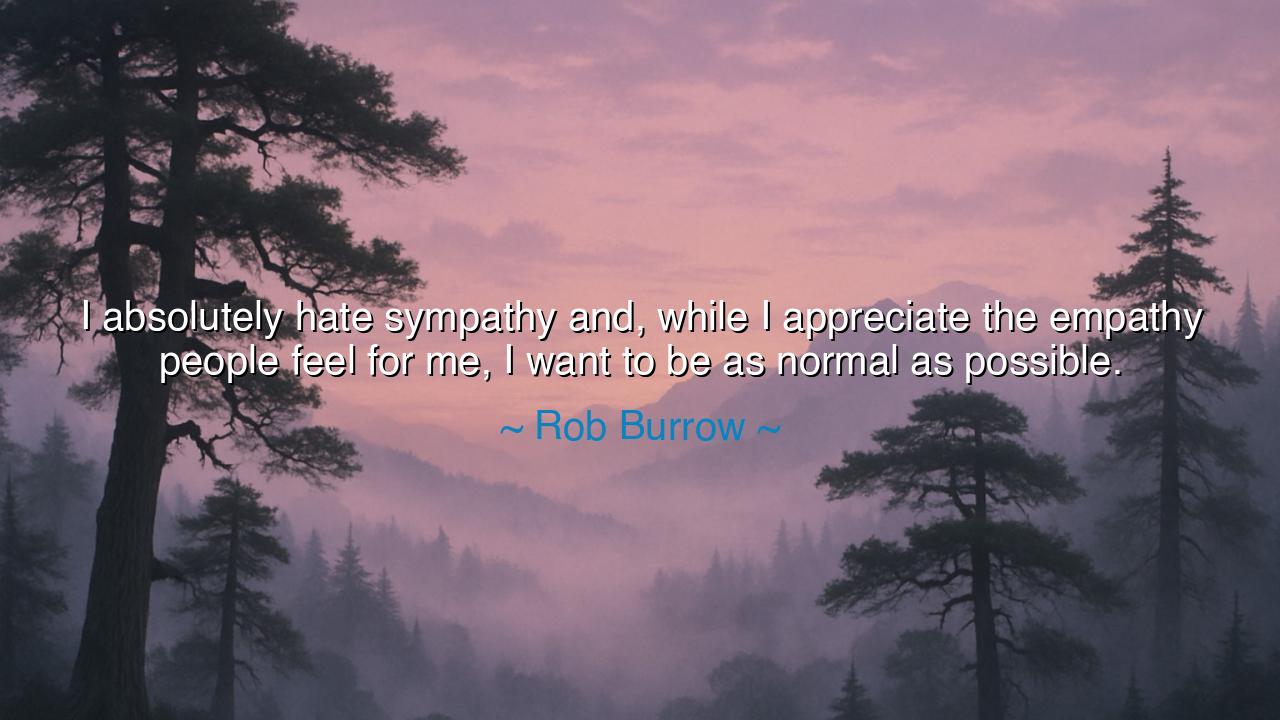
I absolutely hate sympathy and, while I appreciate the empathy
I absolutely hate sympathy and, while I appreciate the empathy people feel for me, I want to be as normal as possible.






In the heart of the human experience, there is a longing to stand tall and remain strong, even in the face of overwhelming adversity. Rob Burrow’s words, “I absolutely hate sympathy and, while I appreciate the empathy people feel for me, I want to be as normal as possible,” speak to the deep and primal desire for dignity amidst suffering. Sympathy, though born of kindness, can sometimes diminish the spirit, for it places one in the position of the helpless or the needy. Burrow’s desire to remain normal, to continue his life without being defined by his challenges, is a cry for respect, for the acknowledgment of the person beyond the struggle.
Throughout the ages, warriors and heroes have faced immense trials yet strove to carry on as though they were no different from any other. Consider Hercules, the great hero of Greek mythology. He was a man of extraordinary strength, yet he was subjected to the cruelest of labors—tasks that would break the spirit of any lesser soul. Yet, what made Hercules truly heroic was his determination to face these challenges not as someone in need of pity, but as a man committed to his purpose. Rob Burrow’s struggle with illness is no different. Like Hercules, he faces a great trial but wishes to be seen as a man of purpose, not as a symbol of suffering.
This concept is found throughout the history of great leaders and philosophers. Take the example of Socrates, who, when faced with the death sentence, refused to accept sympathy from his followers. Instead, he embraced his fate with a strength of character that inspired those around him. His decision to face his death with equanimity and courage, without allowing the sorrow of others to weigh him down, is a testament to the idea that true strength lies in maintaining one’s composure and integrity amidst adversity. Burrow’s refusal of sympathy is not an act of pride, but an expression of a deeper strength—the strength to stand in the face of suffering, yet refuse to let it define who he is.
The ancient Stoics, such as Epictetus and Marcus Aurelius, held that the essence of life lies not in the circumstances one faces, but in how one responds to them. They believed that true freedom and peace come not from avoiding hardship, but from embracing it with a sense of detachment and strength. Burrow’s rejection of sympathy aligns with this Stoic wisdom. He does not want his life defined by what he has lost, but by what he still possesses: his will, his mind, and his spirit. In rejecting sympathy, he is not rejecting love or understanding, but rather affirming that he is more than his condition. He is whole, even in the face of great adversity.
Consider also the story of Nelson Mandela, who, after spending 27 years in prison, emerged not as a victim, but as a leader who inspired the world with his message of forgiveness and reconciliation. Despite the profound suffering he endured, Mandela never allowed himself to be viewed as a man defined by his imprisonment. He wanted to be seen as a man of vision, of strength, and of hope. In a similar vein, Burrow’s desire to be seen as "normal" is not an attempt to deny the reality of his struggle, but an affirmation of his humanity and his agency—his ability to control how he is seen, even in the midst of difficulty.
Therein lies the deeper lesson: in the face of suffering, we must never lose sight of our own dignity. To seek sympathy is to accept a position of helplessness, but to seek normalcy is to assert that our worth is not tied to the challenges we face. It is a call to action, to rise above adversity, not with bitterness, but with grace and resolve. It is in the way we carry ourselves in the face of suffering that we show the world our true strength.
Let us then learn from Burrow’s example and from the great heroes of history: that our suffering does not define us, but our response to it does. In times of struggle, we must seek to preserve our dignity and strive to live our lives as fully as possible, not as those who are broken, but as those who are unbowed. In embracing our normalcy, we find the true strength to rise above, to inspire others, and to remind the world that even in the face of adversity, the human spirit remains unyielding.






AAdministratorAdministrator
Welcome, honored guests. Please leave a comment, we will respond soon